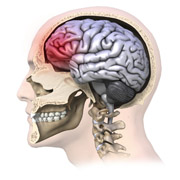Research and Innovation, UNL Office of

Center for Brain, Biology, and Behavior: Faculty Publications
Document Type
Article
Date of this Version
8-16-2023
Citation
BRAIN COMMUNICATIONS 2023. https://doi.org/10.1093/braincomms/fcad215
Abstract
Mild traumatic brain injury is a complex neurological disorder of significant concern among athletes who play contact sports. Athletes who sustain sport-related concussion typically undergo physical examination and neurocognitive evaluation to determine injury severity and return-to-play status. However, traumatic disruption to neurometabolic processes can occur with minimal detectable anatomic pathology or neurocognitive alteration, increasing the risk that athletes may be cleared for return-to-play during a vulnerable period and receive a repetitive injury. This underscores the need for sensitive functional neuroimaging methods to detect altered cerebral physiology in concussed athletes. The present study compared the efficacy of Immediate Post-concussion Assessment and Cognitive Testing composite scores and whole-brain measures of blood oxygen level–dependent signal variability for classifying concussion status and predicting concussion symptomatology in healthy, concussed and repetitively concussed athletes, assessing blood oxygen level–dependent signal variability as a potential diagnostic tool for characterizing functional alterations to cerebral physiology and assisting in the detection of sport-related concussion. We observed significant differences in regional blood oxygen level– dependent signal variability measures for concussed athletes but did not observe significant differences in Immediate Post-concussion Assessment and Cognitive Testing scores of concussed athletes. We further demonstrate that incorporating measures of functional brain alteration alongside Immediate Post-concussion Assessment and Cognitive Testing scores enhances the sensitivity and specificity of supervised random forest machine learning methods when classifying and predicting concussion status and post-concussion symptoms, suggesting that alterations to cerebrovascular status characterize unique variance that may aid in the detection of sport-related concussion and repetitive mild traumatic brain injury. These results indicate that altered blood oxygen level–dependent variability holds promise as a novel neurobiological marker for detecting alterations in cerebral perfusion and neuronal functioning in sport-related concussion, motivating future research to establish and validate clinical assessment protocols that can incorporate advanced neuroimaging methods to characterize altered cerebral physiology following mild traumatic brain injury.
Included in
Behavior and Behavior Mechanisms Commons, Nervous System Commons, Other Analytical, Diagnostic and Therapeutic Techniques and Equipment Commons, Other Neuroscience and Neurobiology Commons, Other Psychiatry and Psychology Commons, Rehabilitation and Therapy Commons, Sports Sciences Commons


Comments
Open access.